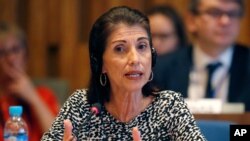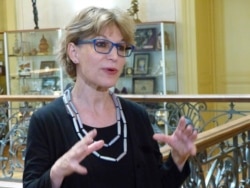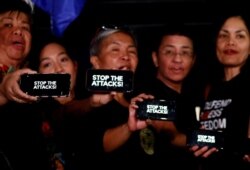Diane Foley says it feels like a miracle.
Six years after Islamic State militants in Syria beheaded her son, American journalist James Foley, 40, the U.S. government charged two British men in federal court this month in connection with his slaying.
El Shafee Elsheikh and Alexanda Kotey pleaded not guilty of involvement in the death of Foley and other American, European and Japanese hostages, including U.S. freelancer Steven Sotloff, but the pair now face the prospect of a trial and ultimately — as Foley’s mother puts it — “some measure of justice.” That’s an extreme rarity in journalist killings across the globe. In nine out of 10 cases, those responsible are not held accountable, according to experts on impunity.
Recent high-profile cases — including Foley’s — demonstrate potential pathways to success. A U.S. court last year ordered the Syrian government to pay $302.5 million to relatives of renowned war correspondent Marie Colvin, holding the regime liable for her killing in Homs in 2012.
The relatives of Daphne Caruana Galizia are seeking damages from five individuals accused of involvement in her 2017 killing in Malta.
The U.S. Treasury Department sanctioned 17 Saudi officials over the 2018 killing and dismemberment of Washington Post columnist Jamal Khashoggi in the Saudi Consulate in Istanbul, though, notably, didn’t sanction Crown Prince Mohammed bin Salman, whom the CIA and the United Nations link to the killing. Salman has denied ordering Khashoggi’s death.
Yet even these prominent cases emphasize the immense roadblocks to justice. Experts say prosecutions and investigations benefit from public pressure as well as engaged and effective advocacy by journalists’ families and colleagues. Stronger domestic and international government action could make a difference, but the challenges remain great, whether in going after militant groups or state actors.
Threats to the powerful
As the United Nations special rapporteur investigating extrajudicial and summary executions, Agnes Callamard investigated the most high-profile killing of a U.S.-based journalist in recent years and published a report on Khashoggi’s death. She notes that many slain journalists are killed over investigative work that threatens the powerful.
“They will have uncovered corruption,” Callamard said. “They will have uncovered criminal gangs. Everyone that is the object of such investigation may be particularly keen on silencing the journalist.”
An additional challenge: These killings are seldom carried out by one person acting alone. “In fact, you have an entire ecosystem or collection of people involved,” said Kerry Paterson, deputy advocacy director at the Committee to Protect Journalists. “You may have someone who pulled the trigger, but you also have someone who drove the car and a mastermind who ordered the thing.” The New York-based advocacy organization has been tracking prosecutions in killings of journalists since 2008 for its annual Impunity Index.
Keeping the pressure on requires the steadfast commitment of families and colleagues — a key factor in the high-profile cases of recent years. “When you have a family that's not just willing and wanting to stay engaged, but in a position to do that in a way that is productive, that is really one of the biggest advantages you can have,” said Elisabeth Witchel, an advocate for ending impunity in crimes against journalists, who has consulted for the Committee to Protect Journalists.
A case in point, Witchel said, is the family of Caruana Galizia, “the most tenacious group” she said she had encountered in 10 years of covering impunity.
Caruana Galizia, a journalist reporting on corruption in Malta, was killed in a car bomb blast. Her family used social media and other means to keep the case on the public agenda and push the Maltese government to act.
The country’s prime minister stepped down last year following calls for his resignation amid investigation of Caruana Galizia’s death.
'Very difficult' to see justice done
Caruana Galizia's sister Corinne Vella said that no one has yet been punished for the crime, though three men are awaiting trial for planting and setting off the bomb. Vella’s big takeaway has been how critical public support is to the pursuit of justice. “Unless you have very strong public sentiment in favor of justice, getting justice is going to be very, very difficult,” she said.
Another difficulty is when journalists may be killed by the very governments charged with investigating their deaths.
In the Khashoggi case, Saudi Arabia put five unnamed people on trial, in a move criticized by Callamard and Khashoggi’s fiancee. The death sentences were ultimately commuted and the Saudi state remained untouched.
"It is meaningless to have Saudi Arabia responsible for an investigation into the alleged killing of Jamal Khashoggi when they are the alleged killers," said CPJ's Paterson.
That’s why experts like Callamard say independent investigations are vital. She has proposed the creation of an “international investigatory mechanism” focused on attacks against journalists, which would either support local authorities around the world in pursuit of justice or launch its own independent probes.
She has recommended that the United States adopt “Khashoggi sanctions” — perhaps as part of the existing Magnitsky sanctions program — that would factor in command responsibility and the culpability of senior officials who order, incite, or condone violence against journalists.
US legislation
She has praised the Jamal Khashoggi Press Freedom Accountability Act recently introduced in the U.S. House of Representatives, which she said “will do exactly what I have suggested.”
"That could make a difference in terms of sending the right message and holding those responsible to account,” Callamard added.
World leaders can also contribute to a safer climate for journalists by ratcheting down their anti-press rhetoric, a trend developing with rising authoritarianism globally. “Words have consequences,” said Paterson. “Words of leaders carry significant weight and impact.” Her group has found an uptick in journalists jailed on “false news” charges in recent years.
“There's a tangible line between public disparaging of the press by global leaders and an uptick in journalists arrested, being threatened, facing online harassment,” she added. “While we've seen variances in the number of journalists killed, it's not because it's getting safer for journalists everywhere but rather that in some of the most dangerous places — parts of Mexico, large swaths of Syria — there are just fewer journalists left to tell the story."
This speaks to another avenue of accountability and justice for slain journalists: Colleagues can pick up the baton and pursue the stories they were killed for.
"You can kill the journalist but the story doesn't die," said Witchel. "When the story is connected to the killing, it often highlights leads. If nothing else, it often shows what the police have failed to pursue."
Ultimately, pursuing justice for journalists requires patience and a commitment to a long-term fight. Witchel said she thought the Khashoggi case has had a “catalyzing effect,” alerting the world to the issue of journalist killings like nothing before.
Yet she’s cognizant that the high-profile cases represent just a sliver of the killed journalists across the world, the vast majority of whom will never see justice.
Most get little attention
“Every case is such a tragedy, and it’s good to see a global reaction to Foley and Khashoggi and Caruana Galizia,” she said. “But the truth is, the vast majority of journalists killed — 90 percent — are local journalists and people you’ll never hear of. It's a small-town political reporter living far outside the capital in Brazil. It’s all the journalists in Mexico working on a daily basis covering crime. ... These are journalists getting killed and not getting this kind of attention.”
Yet high-profile cases can raise awareness about the broader issue of journalist killings and impunity. Family members like Diane Foley will press on, chasing justice not just for their loved ones but for slain journalists everywhere.
In the short term, Foley hopes the charges against two men in her son’s case will lead to the recovery of his remains as well as those of other hostages.
“Accountability takes years,” she said. “I mean, Jim was murdered six years ago, and we’re just at the first step by having them [the two men charged] here in the States. But it’s a huge step, because no matter what administration takes over in 2021, the Department of Justice has to see this through. I’m so grateful for that. That was a long time coming.”







